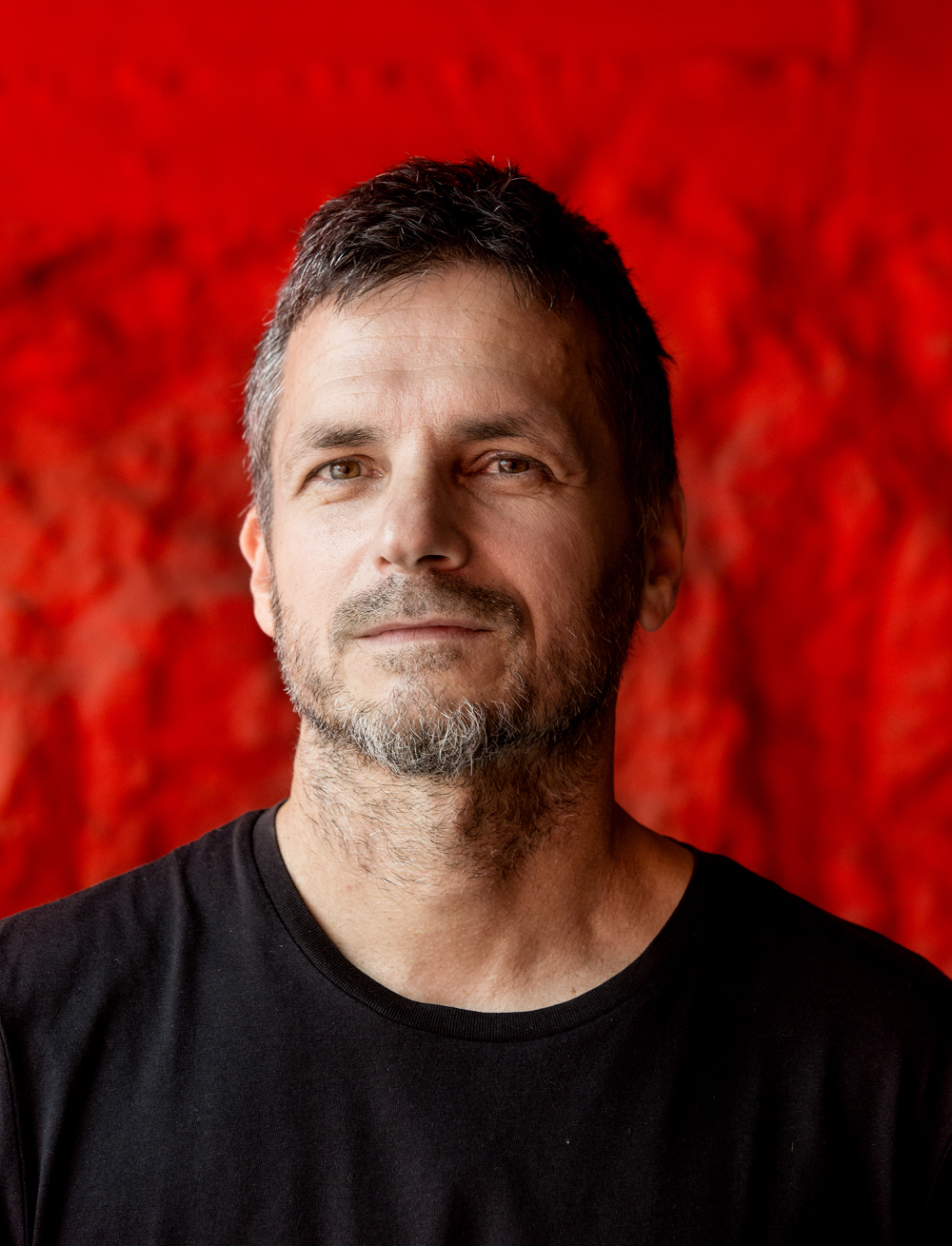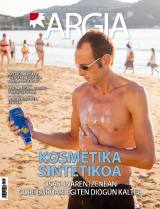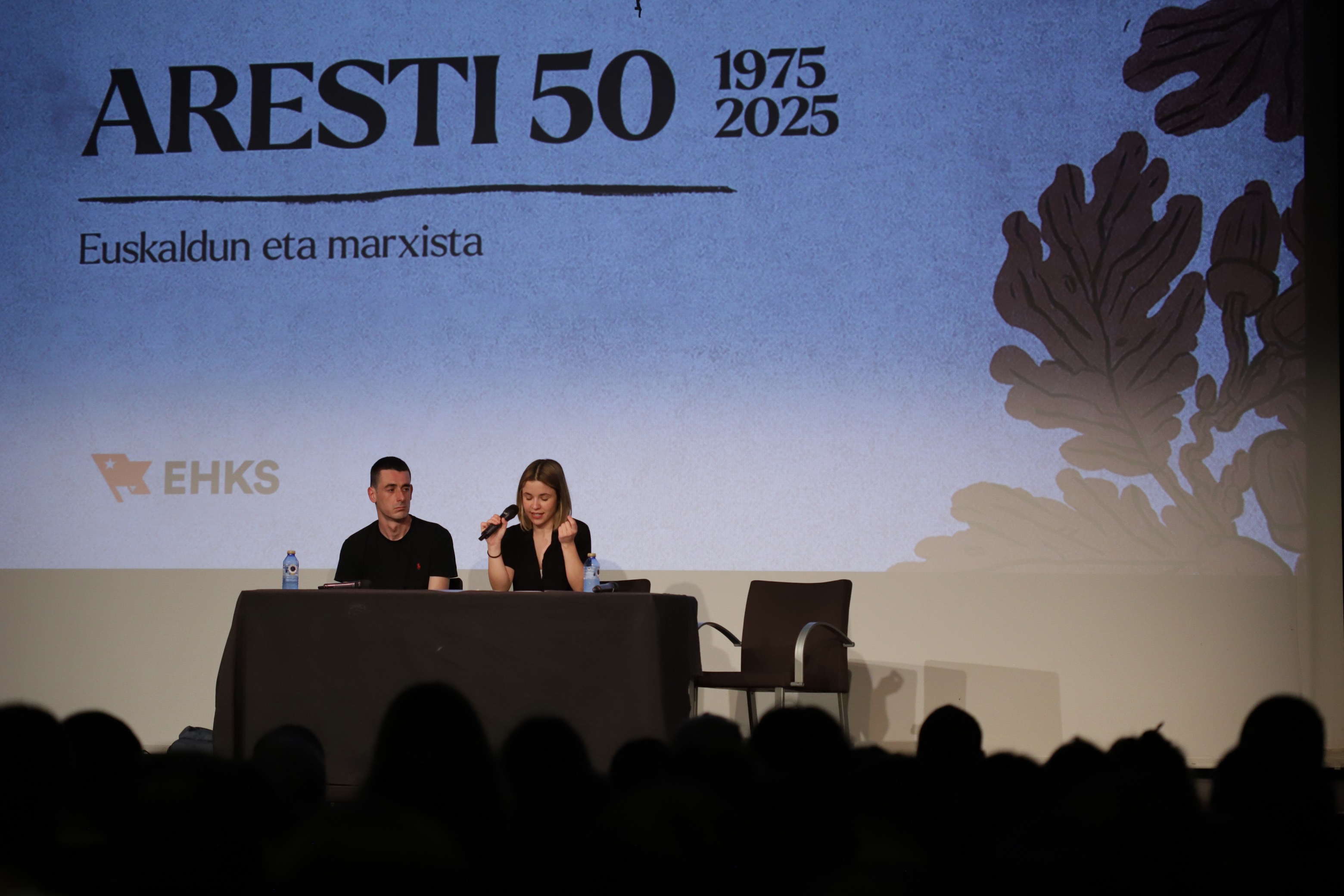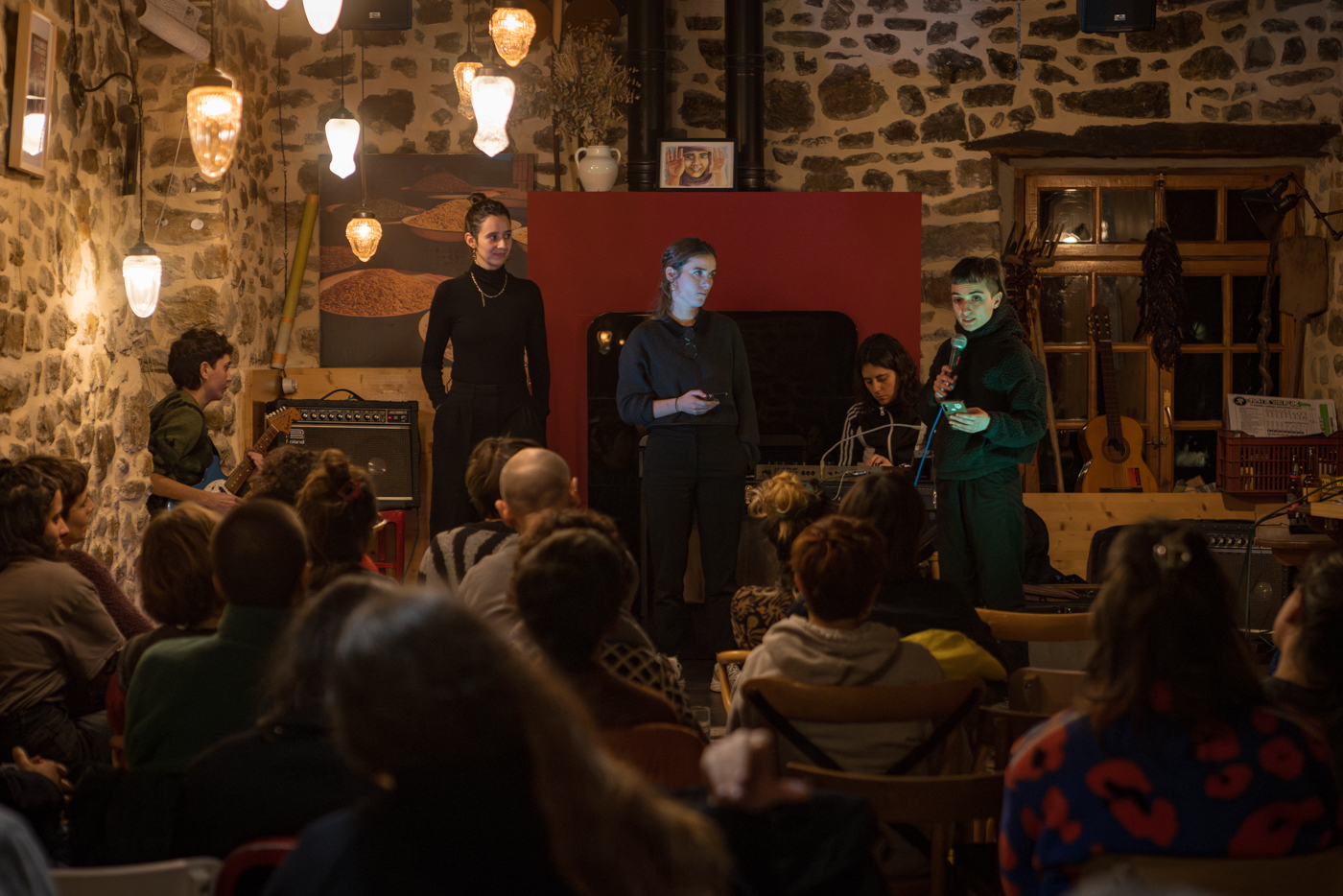"We're afraid of boredom because we don't want to look inside of us."
- Organized by the Basque Association Blagan de Hondarribia, on June 7 Martxel Mariscal presented the book of poems Azken zakatzak in the town's house of culture and the room was filled to the neck. It was a special day: we talked about the work he has published from the hand of Susa, the music and the social situation we live in. And we were very grateful to Mariscal for his effort, who was speaking for almost two hours, dealing with the disease that has conditioned his life for years. Some cuts of what we recorded that day are the ones we offer below.

This book has raised a great deal of expectation since it was announced, I would even say that it has outperformed the usual audience of poetry buffs. How do you experience this welcome?
I do not have a tour of Basque literature, years ago I published my first novel and had two other novel that was underway, but unfortunately, because of a disease they have stayed at home. Since November 2003, I have had neuropathic pain. Now I'm in another stage, but still my quality of life is very low and limited. I have not been able to associate any production in these years, I do want, but I cannot. So I find it difficult to measure it: I don't know about marketing, and I don't want to know, but it's very rewarding to feel that there's been that curiosity.
What's been writing the latest outbreaks?
We are at another stage with the doctor and the motto is to increase boundaries and borders, even if we collide against the wall. In that struggle, writing has been a challenge, but also a pleasure, of course. I've always been demanding of myself and I'm not willing to publish anything. My goal was to write and say “it’s worth it, I’ll try to say goodbye.”
The whole book is crossed by the sickness you suffer and the pain it causes you. I think it was essential that it should appear.
“I don’t like the pamphlet literature, we need other kinds of texts to write them”
I always separate that one thing is sickness and another is pain. There are people who are sick and do not know until, unfortunately, it is late. The worst is pain. When there is pain, there is nothing else. If someone has had the experience of pain, and not the pain of a moment's toothache or the pain of a small ear, which you will probably remember, but the pain that lingers over time: it's a very vital experience, a very hard shock, and you have to work a lot as a person. Or you give up and this causes other kinds of diseases to come, very dark and very heavy; or you keep fighting. Fortunately, I have reasons to keep fighting, I'm surrounded and I want to do things, look forward. One of the poems says: “Life is made forward.” I have that thought often, when we leave here, life continues or begins.
In the presentation you said you had been “fishing” to compose these poems. When I read, it seemed to me that they're very visual and fragmented. Was it something you've been looking for?
Everything is wanted, by chance there is nothing, it is a work done consciously. I behave like a punch: I do not like the pamphlet literature, we need other texts for pamphlets and dogmas – and they are necessary, of course; but not in poetry, at least, as I understand it. I don't understand poetry as something romantic, I think it's a profound work where everyone talks to themselves and to society. In this work, beyond this daily linguistic pragmatism, you put yourself somewhere else.
When I made songs, with Xabi [in front of Xabi López, member of the Beti Mugan group] and with another Xabi (on the left, Xabi Strubelli) I liked to play with words, not only by the game, but by creating images, colliding between words, putting adjectives with nouns that do not belong to them, for example. When they tell you things directly, for example in Basque rock – “the police are bad”, “we need freedom” and things like that – or in romantic songs, you know what they will say before the end of the line, you lose weight. In that sense, poetry itself is a challenge.
To do something that is not easy to predict.
That's it. I've had an anecdote related to: When we made the first long album with Beti Mugan, we were interviewed on the radio. In the song Rest Time of that album there is a moment that is said “analyzing the cartoons every night”. Someone called to explain to him what he meant. I do not need to explain it, in its context, it has a force; if someone asks themselves, there has been an effect there. I believe that in poetry too we must maintain that point of mystery, if we do not reach other planes.

How do you create those strong images in your texts?
They come to me, and I tend to write the way they come. By the formation and by my trajectory, English seems to me a very appropriate tool when writing sudden things, so I do a lot of times a porrusalda: I start in Basque, I continue in English, then in Spanish… I have those drafts. And then I realize what the essence really is. I start to work seriously on a second batch, but the images are already there and normally, the most powerful images come out on that snapshot. Then, a writer has to know that everything he does is not worth it, but everything you do is worth it to get somewhere.
There are many contrasts in the last sacks: the language of the fishermen on one side, the skate park and the wet t-shirt contests on the other.
“Children are too mature and adults are too influenced by television and since the digital world comes”
I've always seen myself in two worlds, from a young age. All the neighbors were from the fishermen's family, the parents of most of my fifths, like mine, skippers; in our house and with my friends there was a kind of language. And all of these friends went to national schools. I, on the other hand, because my parents made a bet for that, for the ikastola. I was very conscious of it, going to the ikastola and collecting a culture, a way of speaking in Basque, very different from the language of my neighbors. In my formation this topic of the two worlds has gone further: I had the opportunity to go to the United States to study Sociology, I was there four years, I went to work in Boston in a second stage… It is not a question of theory, I have lived directly the issues that come out. For example, go to Miami and suddenly see in a room a contest for women's wet t-shirts. In 1985, for a guy from Hondarribia, it was to see that… “What is this?” That’s why there are some gestures in the book, because I had been inside going to tuna at the age of 15, being from a specific neighborhood, from a specific town… How many times did I say: “If I call the crew they have to flirt.” I saw another society.
But the United States appears in a very familiar way, you have not used cultural icons that are known to us.
I mention Fellini at times or “sasi-dylans singers” and I am very tempted to say things about Bob Dylan, because it has always been special to me. As a young man, my brother brought the Tarantula, Dylan's poem book, and I spent an afternoon reading in the rocks below, where was the Jaizkibel parador. It was like finding a new world. But I didn't want to get too much into that, I've worked more from personal experiences.
There is also a desire to connect with childhood, but without infantilism.
This is one of my concerns in today's life. We all know that the historical paradigm has changed. First of all, it was very clear, everything was very rigid. The concept of work and family has now been changed, and with them too some dogmatisms. In that transition, there are a lot of people lost, or we're lost. Neil Postman had a very interesting book. The disappearance of childhood. According to him, the Middle Ages do not distinguish between the world of children and the world of adults. Until the age of seven they were still children, but from then on they were able to speak as adults, they appropriated language and from then on they became adults. There was no clothing or games for the kids, they dressed and talked like adults and there was no school for the kids. Then, at the time of the printing press, the adults started to have their secrets and desires to protect from the little ones a weapon, maturity: if you weren't literate you couldn't get to that. And with it came schools, games for children, clothing… There began to differentiate the worlds of children and adults. But when television exploded in the 1950s, this division was eliminated again: every child has since had a window open to the world of adults, with all the consequences that this entails. In my view, the consequences are to a large extent detrimental, as children are not being allowed to develop properly. Let's say nothing since the advent of the digital world. So I mention in one of the poems that children are too mature and adults too young.
“In what we create and exchange we find the reason for our being”
The posters of the films that you will see over and over again point to the shortcomings of the society in which we also live in the poem. Do we live with too many artifacts?
We live in a very interesting time and we are very lucky, there are so many interesting things, there is such potential in many areas… If we use it well, of course. But unfortunately, the “welfare society” surpasses it. With this name it seems very nice, but it's a tremendous trap: we have enough with work, with family, and instead of fatigue, what we want is entertainment, all the experiences are focused on it. And it’s OK, it’s necessary to have a catharsis, but if we stay alone in that – and it’s happening – then our identity, that of communities like ours… The future is not written, but… What will we be tomorrow, a small paradise for some elitist tourists? For example, the danger is there. Do we stay in folklore? I have all those concerns and those thoughts we have to make now, because behind us is a very powerful youth. We have to be mindful, but I don't want to hold a pessimistic speech: I see many positive aspects, but for that, in addition to entertainment, we have to work conscious attitudes.
What does literature and poetry contribute in this sense?
A gap in the current march. The rhythm we live in becomes a trap, we're afraid of boredom, and it's significant. If we get bored, it's usually because we don't want to look inside of us. When there is a moment of silence you are bound to find yourself and you may not like what you see; then, you are bound by entertainment. I don’t think that in poetry or literature there should be round truths, “this is nice, this is ugly; this is OK and this isn’t”… But it does have to be an encouragement. We know what the hegemonic discourse is, so the literature, both by the author and the reader, should be a personal commitment: “This is my small offer.” In this human network, works of art and creation are essential. We live differently in a very pragmatic society. Starting with education, we only measure what is useful, but the human being is much more, beyond that utilitarianism and consumerism: in what we create and exchange, we truly find our raison d'être.
Astelehen honetan hasita, astebetez, Jon Miranderen obra izango dute aztergai: besteren artean, Mirande nor zen argitzeaz eta errepasatzeaz gain, bere figurarekin zer egin hausnartuko dute, polemikoak baitira bere hainbat adierazpen eta testu.
Martxoaren 17an hasi eta hila bukatu bitartean, Literatura Plazara jaialdia egingo da Oiartzunen. Hirugarren urtez antolatu du egitasmoa 1545 argitaletxeak, bigarrenez bi asteko formatuan. "Literaturak plaza hartzea nahi dugu, partekatzen dugun zaletasuna ageri-agerian... [+]
1984an ‘Bizitza Nola Badoan’ lehen poema liburua (Maiatz) argitaratu zuenetik hainbat poema-liburu, narrazio eta eleberri argitaratu ditu Itxaro Borda idazleak. 2024an argitaratu zuen azken lana, ‘Itzalen tektonika’ (SUSA), eta egunero zutabea idazten du... [+]






















